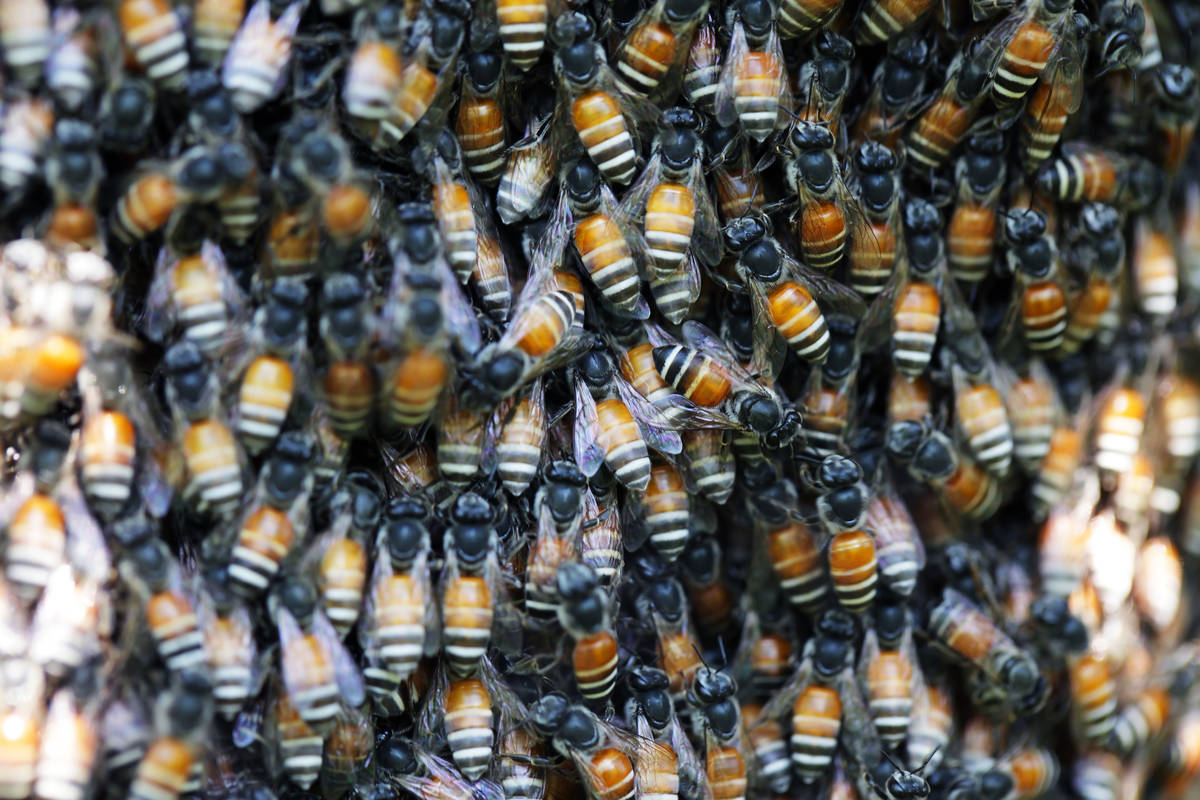Bee swarming season has begun, Las Vegas Fire Department warns
As the coronavirus pandemic rages on, the Las Vegas Fire Department on Wednesday asked valley residents to be aware of another public health danger — bee swarming season.
March and April typically marks the beginning of the season, when bees are moving place to place and have a higher likelihood of stinging people when agitated, the Fire Department said. Warmer weather and increased outdoor activities — when people aren’t staying inside to social distance — also increase the possibility of bee encounters.
Swarms already have been observed in the city this week, according to the Fire Department.
When swarming bees get tired or hot, they find a place to stop and rest, usually on tree branches, street signs, fences, the sides of buildings or other objects such as fire hydrants, the department said. Because the swarm is not producing honey or caring for young bees, the bees will not sting someone unless they are provoked and should be left alone.
The bees usually will rest for a few hours and move on, the department said. Exterminators usually will not kill bees during this time but rather will put up safety tape to warn people.
If swarms remain for more than three days, a professional bee removal service can handle the swarm, the department said. If the bees are exterminated, there’s a chance for stragglers to remain in the area and be “irritated” because they can’t find the rest of the swarm.
Beehives are more dangerous. Bees will sting when they feel their food supply or young are threatened. Beehives can be found in places such as inside sprinkler control boxes, street light poles, utility boxes on sidewalks, and inside walls or hollowed-out trees and desert plants, the department said.
When bees defend a beehive, it can lead to hundreds of stings, the department said. Noises such as pounding the ground or vibrations from tools such as lawnmowers or weed eaters can prompt the stings.
Beehives should be removed by professional bee removal services and are the responsibility of the property owner, the department said. The city of Las Vegas does not remove beehives that are on private property.
“Past attempts of people trying to exterminate bees themselves have led to serious injury and death” in the valley, the department said.
In September 2018, three dogs died after they were attacked by bees coming from a hive at a neighbor’s house, the Fire Department said. The year before, three people were attacked, two of whom were hospitalized, and a dog died after a swarm of bees started stinging.
If you are starting to be stung by a swarm of bees, you should run from the bees “as quickly as you can” and cover your face with your hands or a shirt, the department said. Seek shelter in a vehicle or building, and do not jump into a pool or lake as the bees will continue to sting when you come up for air.
Try to avoid loud or humming noises such as barking dogs, lawnmowers, weed eaters and flashing lights, as “the bees will continue to be agitated after the attack,” the department said. If someone is being attacked, call 911 immediately.
Call 911 if someone who has been stung becomes dizzy, nauseated or has difficulty breathing. If you are stung, scrape the bee stinger out of the wound and wash the area with soap and water.
It’s recommended for anyone stung more than 10 times to call a doctor or visit a walk-in clinic, the department said. Do not call 911 to report a bee swarm that is not stinging anyone. Call 702-229-2000 for a recorded message from the Fire Department about swarming season and safety tips.
Contact Katelyn Newberg at knewberg@reviewjournal.com or 702-383-0240. Follow @k_newberg on Twitter.























